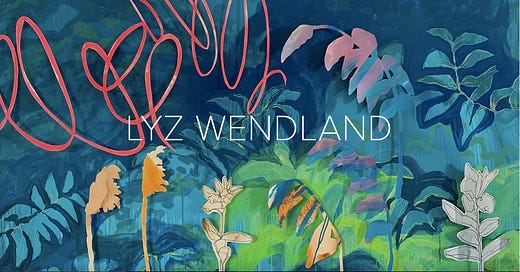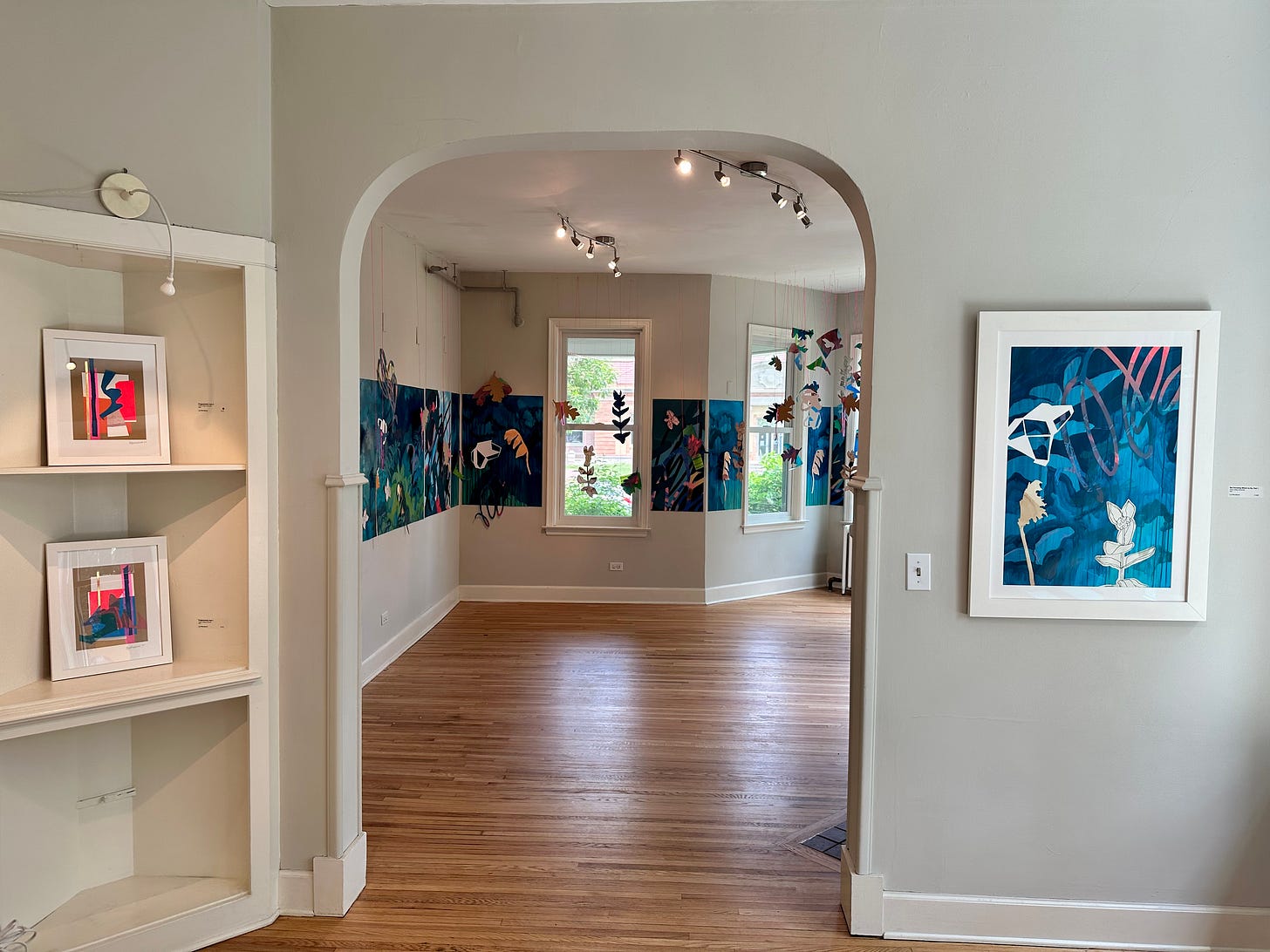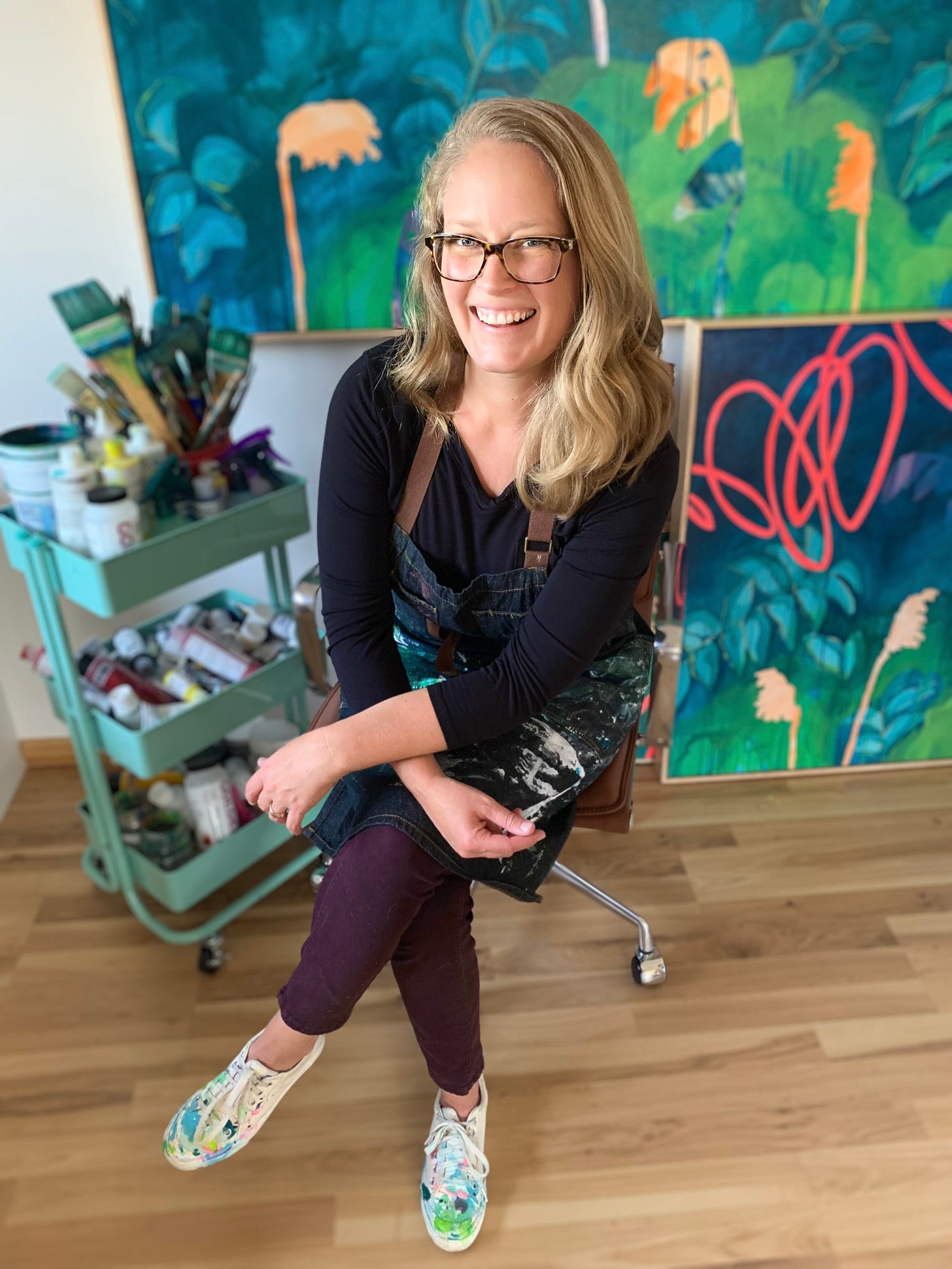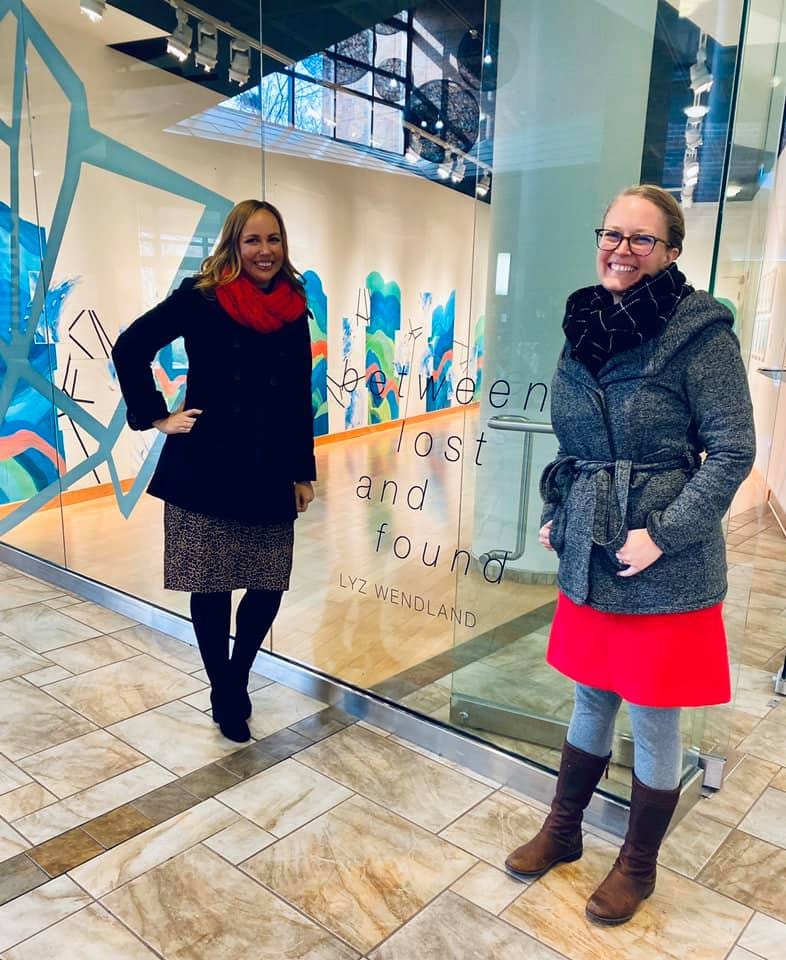Today marks our first interview post on
, and I’m so excited to share this conversation with you. I think you’ll really enjoy meeting artist Lyz Wendland, who I have known for decades, yet who still in this conversation shared with me such important new perspective into spirituality, trauma, connection, resilience, and beauty.Art image taken from https://www.lyzwendland.com
Maybe you’re wondering why I chose to start interviews on
with an artist, when many of you probably know that visual art is not my area of expertise. In fact, my drawing of a friend in 7th grade art class was the object of no small amount of ridicule.And while I’m still not at all confident making visual art, I’ve realized something as I’ve more strongly identified as a creative, a writer, and as someone who wants to challenge established systems and institutions. Artists and writers need each other, desperately. In times of war and fascism and violence and poverty, it is the poets, the musicians, the writers, and the artists who both chronicle the truth of the times and give hope and emotional sustenance to a world in desperate need.
Too often, when you study the personal histories of artists and writers and creatives of the past, you notice that their lives were lonely and tortured. Sure, they’re famous now and celebrated - but in their lifetimes, they often wondered if anyone was hearing the message that had been placed so fiercely on their hearts to share with the world.
As someone who writes often at the confluence of faith, spirituality, religion, the Church, politics, and social issues; I’m all-too-aware of the ways in which the broader culture, often especially religious culture, seeks to silence and shut down the artists and writers among us. I think that’s why so many creative people often live with anxiety, depression, addiction, and mental illness. And still many of them (many of us!) have turned to our writing and our art to deconstruct our trauma and create something true, meaningful, and beautiful.
I may have borrowed that last idea from artist Lyz Wendland herself. I’ll let you read it more fully in her statement below, and then I’ll share our interview.
Lyz Wendland: Artist Statement
Inside the core of my work, I am driven by the belief that our traumas can be reshaped into sources of strength, resilience and beauty. I explore this through a method of repurposing my former artworks and breathing new life into their narratives.
My artistic process is grounded in an interplay of color and shape. It involves creating multiple pieces at a time. I alternate between working in numerous mediums and scale to mimic the back-and-forth rhythm of life. Acrylic, gouache, natural inks, digital marks and collage are applied with structure and without. This methodology provides a connection I strive for, combining the dichotomy of dense elements and clashing materials.
I find the act of cutting up, ripping, and rearranging liberating. Within this practice, I escape limitations and embrace the freedom to reinvent and redefine with a new perspective. Through these explorations, the work confronts viewers’ assumptions about space, place and thought, while casting familiar imagery into new contexts.
My interview with artist and art professor Lyz Wendland
Angela: I’m sure you get this question often - and it’s not an easy one to answer, but, I know many will want to know. What kind of artist are you? That is, if you had to describe some of the common themes behind your work and your art, as well as typical mediums, what would you say?
Lyz: I would say … I’m a mixed media, abstract artist. The themes within my work mainly have focused on repurposed artwork (that I’ve done in the past); probably 90 percent of my current work is repurposed art. The messaging behind that is to take our past stories, take any stories we tell ourselves - and recreate something from them. It’s taking our global and individual trauma and re-purposing that into something that can bring strength.
I purposely work in multiple mediums because it just provides more opportunity.
You can see Lyz’s most-recent artwork in her solo show at Art Reach St. Croix in Stillwater, Minn., until June 24.
She is also participating in an online show with Sharp Hands Gallery, viewable here.
A sneak peek inside Lyz Wendland’s show at Art Reach St. Croix
Angela: These themes of mixed media, repurposing, repurposing from trauma - are those new in your art or have those always been latent in the past?
Lyz: I feel that they’ve always been there, but I don’t think I’ve been brave enough to share them - in words - until recently. It’s taken a lot of me working through my own trauma to get to a point where I feel comfortable saying, “Yep. This is what I’m doing.”
I hope that people are able to slow down in the midst of chaos. My work is very chaotic and maximalist, in a way, which, if you know me, you know that I’m not really like that. That all comes out in my artwork. All my color comes out in my artwork. My clothes are 90 percent black … a colleague said that about me once, that “all of Lyz’s color comes out in her artwork.”
I hope that people can resonate some way, because we all have our own trauma experiences, and I think the last few years with COVID really motivated me to start opening up and sharing this more in my work. Because we have experienced this collective trauma, even as we all experience it in different ways, and acknowledging the privilege I bring to it, and the privilege I have to take time to make this art.
If people can see that and feel connected — I think the biggest thing with my work, and my biggest value in life … is connection. Creating work and exhibiting it gives me the opportunity to create connection with other people.
Angela: I think we share that.
Lyz: Yeah. You do it with words, and I do it with images.
Angela: It’s funny, because both of us can be shy, too, but there’s that real value for genuine connection.
Lyz: Right.
Angela: With this new show and your ongoing creative work, where do you get your motivation?
Lyz: It’s not one thing - it’s everything.
(She shares the quote that inspires her: “Inspiration comes from making.”)
You’re not always going to want to do it. Like, some days I’m tired. That’s something I talk to my students about, too. How do we create a sustainable creative practice?
Sometimes that’s just going into my studio for 10 minutes and setting a timer, and doing something.
It comes from making, but there are certain topics that are main inspirations for me, like working through trauma, and creating connection.
Angela: You mentioned your work as an art professor and a teacher (Lyz has served as Assistant Professor of Art and Design at Augsburg University in Minneapolis since 2018, and was an adjunct professor at several other local colleges and universities prior to that). How has that career influenced the kind of art that you make?
Lyz: Oh gosh, so much. My students are huge inspirations. I think they are so brave and vulnerable. They’re so open to taking risks and trying things, and it definitely reminds me that I need to do that on a daily basis and make that part of my practice.
Angela: I know that you grew up as a PK (pastor’s kid) and very involved in the Church. We both know the sometimes-strained history of Christianity and art - from a powerful European Catholic Church’s commissioning of artwork, and at the same time a Church history that often stifled artists and creatives in general. How do you feel that your Christian upbringing influences your work as an artist?
Lyz: Oofta.
Angela: Yeah, I know. It’s like a book.
Lyz: It’s like this is the book. This is the book that we cowrite together.
Angela: 100 percent.
Lyz: I think that, unfortunately … I grew up in a very fundamentalist Christian upbringing. Because of that, art gives me the freedom to go beyond the roles and titles and things I was told: “This is who you are. This is what you need to do.”
It was very black and white thinking, and my art is very colorful.
Art has really given me the freedom and exploration that I didn’t have in that upbringing.
Angela: As you’ve discovered this sense of freedom in your art, what role do you think spirituality plays in your artwork, even as it conflicts with the church?
Lyz: Going back to connection, I feel like spirituality is about connection to ourselves and then to a higher power. If we look at it from that lens, everything is connected. How we are connected to one another. (Art is a medium for that).
I wouldn’t at this point put in an artist statement that my art is about spirituality, but I think it’s just a component of my artwork. Because of how I feel about connection and spirituality. I think the great thing about spirituality is that I can see another human in pain and have compassion for them. Because I don’t want them to be in pain, but also because spirituality reminds me of our connected humanness.
Angela: Would you say in your artwork that there’s also this sense of … wrestling that you’ve had with God, or trying to reformulate some kind of idea of God that might work for you, after (your fundamentalist upbringing)?
Lyz: (laughs) I mean, I basically take (stuff) and cut it up and use it. It’s like a deconstruction process.
My work is a deconstruction process. I find it extremely liberating that I can take something, and rip it with my hands, or cut it with scissors, and then rearrange it into a way that creates meaning in my life. That’s the symbolism right there.
Angela: You could definitely put a death and resurrection lens onto that. I don’t think you necessarily do that, but I think a lot of my readers are going through their own deconstruction processes, and I think that will be really resonant.
Lyz: Oh yeah, I’m like the poster child for that.
Angela: I don’t think we get to … hear from a lot of artists who are deconstructing right now, even though I’m sure a lot of them are doing it. So it’s a neat connection that we don’t often get to see.
Learn more about Lyz and connect with her and her work at her website.
You can also follow Lyz on Instagram.
I’m sure this won’t be the last time that readers of
hear from Lyz! Let me know what questions you have about deconstruction, art, and how creative work can bring truth, beauty, resilience and strength even out of religious trauma. And please share your stories, too, about the creative work you’re making and sharing with the world.I’m looking forward to sharing more interviews soon! Do you have any requests? Anyone in particular you’d like me to track down? Send me a message or reply in the comments.
A big thanks to Lyz for her participation in this interview!
Lyz and I in 2019 at her show at Augsburg University, which we visited together after my book talk there for Red State Christians. Writers + artists in partnership together can do amazing things.
A Few Notes …
First, a huge THANK YOU to all subscribers. I get a little email notification every time someone signs up, and every time I get one, I feel joyful and honored that you want to spend part of your day with this community. I mean it when I say: “I’m listening,” to you as well, and please don’t hesitate to share with me your thoughts + ideas for what you’d like to read in this space.
To PAID SUBSCRIBERS: I am humbled and honored that you’ve chosen to spend part of your limited budget on this newsletter. To borrow words from another newsletter I love, you are directly funding freelance journalism with your subscription, and I have to thank you more than ever for your continued support. Our world’s media and journalism is in a state of crisis, with fewer and fewer billionaires in control of global news outlets, and journalists being either laid off or threatened with violence for their work every single day; with fewer and fewer newsroom positions paying a living wage. I pledge to you to steward your paid subscription faithfully + use it to support honest, hard-working, and LOCAL journalism. One of my goals in this first year is to open this newsletter to other journalists, and pay them a fair wage for their work.
THANK YOU for your support. If you’re not a paid subscriber, please consider becoming one.
On free vs. paid-subscriber posts only: My plan right now is that the Friday + Sunday posts, focusing on news + spirituality, in that order, are available for paid subscribers only (after this first week). My plan is that the Tuesday blog-style posts will always be free, to enable as much access as possible, while creating a smaller and more intimate experience for paid subscribers, who are also able to comment and share in community in fuller ways.
Free Trial: Substack always offers a free week-long trial subscription to this newsletter, so you can get a taste of the Friday + Sunday posts and see if you’d like to subscribe!
If a paid subscription is a hardship for you, but you’d like access to the Friday + Sunday posts: PLEASE do not hesitate to reach out. I will be happy to provide a complimentary subscription for you.








Thank you, Angela! I shared this with a few friends who I think will resonate with this interview. I followed Lyz on IG and hope to see her work someday. Great interview and looking forward to more.